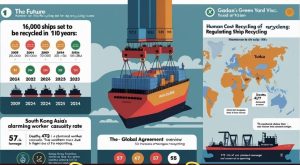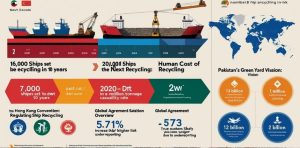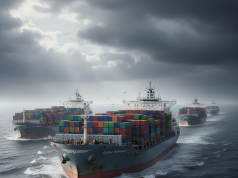Rising Demand Calls for Sustainable Investment
From Kamrul Islam, Chattogram:
An estimated 16,000 ships are expected to become eligible for recycling over the next decade, according to the Baltic and International Maritime Council (BIMCO). This is twice the number of the previous decade and nearly three times more in terms of tonnage. In light of this significant growth, large-scale investment in environmentally sound and safe recycling facilities has become a pressing global necessity.
The shipbreaking industry has already undergone notable international changes. On June 26, 2025, the Hong Kong International Convention for the Safe and Environmentally Sound Recycling of Ships came into force. From now on, the entire process of ship recycling must be conducted in a safe and eco-friendly manner.
Since 2009, at least 8,221 ships have been scrapped in South Asia, resulting in the death s of at least 473 workers and injuries to another 517. However, environmental groups argue that the real numbers of accidents and occupational diseases are significantly higher. Without regular monitoring and proper safety measures, further casualties may occur.
s of at least 473 workers and injuries to another 517. However, environmental groups argue that the real numbers of accidents and occupational diseases are significantly higher. Without regular monitoring and proper safety measures, further casualties may occur.
In this context, the Government of Pakistan has announced a plan to transform the Gadani Ship Breaking Yard into a ‘model green yard’. The project, worth around 12 billion Pakistani rupees, includes the construction of modern equipment, a 30-bed hospital, 32 kilometers of roads, residential colonies, schools, and access to clean water. The foundation of the project was laid during the 2024 visit of IMO Secretary-General Arsenio Dominguez.
Currently, 24 countries have signed the Hong Kong Convention, including Bangladesh, India, Pakistan, and Turkey. Together with other flag states, these countries account for 57 percent of the world’s ship tonnage.
 Regarding the Convention, the IMO Secretary-General commented, “This is a historic step. It is the result of years of effort to ensure safe and sustainable recycling.”
Regarding the Convention, the IMO Secretary-General commented, “This is a historic step. It is the result of years of effort to ensure safe and sustainable recycling.”
However, the NGO Shipbreaking Platform has criticized the Convention, claiming it does not fully address human rights violations and environmental disparities. According to its Executive Director, Ingvild Jenssen, “This agreement primarily offers a cost-effective alternative for shipowners who do not wish to bear the expenses of truly safe facilities.”
Experts believe the coming decade could mark a transformative era for ship recycling—where sustainable investment, worker protection, and environmental safety must go hand in hand. Whether this vision becomes reality will depend on international commitment and local implementation.











